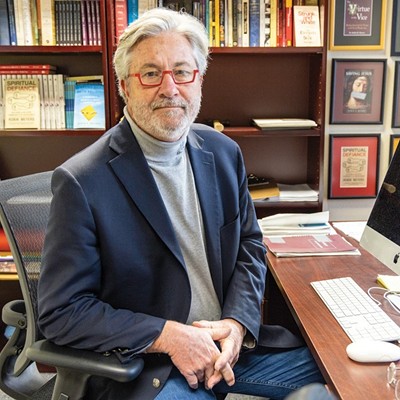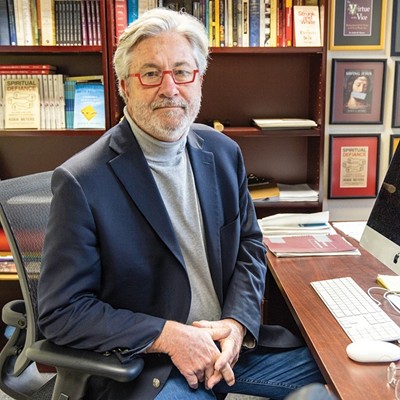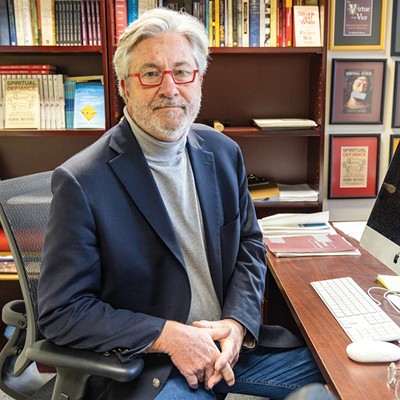Okies apparently don’t like the word “recreational,” but they love the word “medical”—especially when it comes to cannabis.
With roughly 400 dispensaries in Oklahoma City alone, you can’t spit without hitting that green demon leaf that once prompted the propaganda film Reefer Madness. Almost 10 percent of Oklahomans have medical cannabis cards, and they are absurdly easy to get. Someone I know who worked in a dispensary described the process as a kind of quackery of convenience. A doctor sits at a desk, people file in and name some form of chronic pain, and the doctor writes a script and collects his fee. It’s a win/win. But, of course, those same people would never, under any circumstances, use cannabis “recreationally.” Nor would they ever give it to people under 21 or sell it illegally on the street. As for just using it to get high and listen to The Moody Blues, forget about it.
Now that voters have soundly rejected making recreational cannabis available for purchase for anyone 21 and over, they have also rejected the increased government regulations. Saved again. Especially the kids, other than those working in illegal grow houses owned by foreign nationals.
As you would expect, Oklahomans against State Question 820 were the usual suspects, as were those in favor. Urging us to vote no was “father knows best” Gov. Kevin Stitt, some law enforcement agencies and former governor Frank Keating, who, in sync with Stitt, said repeatedly that we can’t have more access to a drug that is “still illegal federally”—that is, unless you have a get-out-of-jail medical cannabis card, and presto—it’s legal!
Urging us to vote yes were some criminal justice reform advocates, the ACLU and some labor unions. Joining them were ordinary citizens who mistakenly thought that a conservative administration would lean toward free markets and personal accountability, and that a growing number of younger Republicans would vote to join the other 21 states (both blue and red) that have legalized recreational cannabis.
Perhaps it would be good for me to say this now. I don’t believe that cannabis products are an unqualified good. Like any substance that alters consciousness and involves the byproducts of combustion, it can be harmful. I also believe that psychological dependence is real, as are the dangers for some of impaired driving. I am also not in favor of cannabis use by teens. But, if the potential for abuse is the standard by which we reject legalization, especially for substances that can also be used properly by adults and have demonstrable health benefits, then what on earth shall we do with tobacco and alcohol?
Here is where that mantra, “Don’t confuse me with the facts,” sits grinning in the corner of every room. First, if cannabis is a Schedule 1 drug, then how should we compare it with alcohol, which causes more harm to individuals, families and society than all the a drugs combined? Six people die every day from alcohol poisoning and almost 90,000 people die annually from excessive alcohol use in the U.S. Tobacco is one of the only products that when used properly kills you. Sugar, in fact, may be more harmful to our health than pot. So far, no one has ever died from a cannabis overdose. Compare this to the tens of thousands killed by American opioid drug cartels who only differ from their Mexican counterparts in the way they dress.
But what about the kids? Wasn’t this the most effective argument made by those who urged us to reject recreational cannabis? Won’t more of them be stoned, impaired and living on the couch? If evidence-based reasoning still has any value, then what about the data showing that legalizing cannabis has reduced its use among teens in states like Colorado, Washington, Oregon and Alaska? From child-resistant packaging to limits on serving sizes for edibles, the rates of use by young people are down. In Colorado, teens reported a nearly 12 percent drop in cannabis use. Perhaps, like the mystique that accompanied prohibition, even teenagers are more attracted to what is illegal.
In states that have only medical cannabis use, on average, traffic deaths have declined, perhaps attributable to the fact that drivers under the influence of cannabis are more cautious and take fewer risks than drunk drivers. Alcohol speeds us up and makes us feel invincible. Cannabis slows us down as it slows down the perception of time itself. As the old joke goes, when you are drunk you blow the red light. When you are high, you creep through the intersection in search of a Twinkie.
One of the most important consequences of legalizing medical cannabis is that it can end the costly use of law-enforcement to arrest and prosecute those who possess small amounts and might even lead to the expunging of prior offenses-giving countless people the chance to start over. If SQ820 had passed, our state would have collected hundreds of millions of dollars to help schools and provide support services that are currently being eliminated. As for the oft-heard warning that “drug cartels are coming in from everywhere,” legalization is what takes both money and power away from cartels. In Oklahoma, there are more than 7,000 licensed growers in our state, many of whom were offered business licenses at a fraction of the price of other states. California, for example, the state we love to hate, has only a quarter of that number. Are we trying to save ourselves from ourselves?
It doesn’t matter. The people have spoken. Well, a fraction of the people, thanks to Stitt’s decision to call for a single-issue stand-alone vote in a non-primary, non-general election. Are we safer? No. Are we poorer? Yes.
Reefer madness indeed.
The Rev. Dr. Robin Meyers is pastor of First Congregational Church UCC in Norman and retired senior minister of Mayflower Congregational UCC in Oklahoma City. He is currently Professor of Public Speaking, and Distinguished Professor of Social Justice Emeritus in the Philosophy Department at Oklahoma City University, and the author of eight books on religion and American culture, the most recent of which is, Saving God from Religion: A Minister’s Search for Faith in a Skeptical Age. Visit robinmeyers.com











